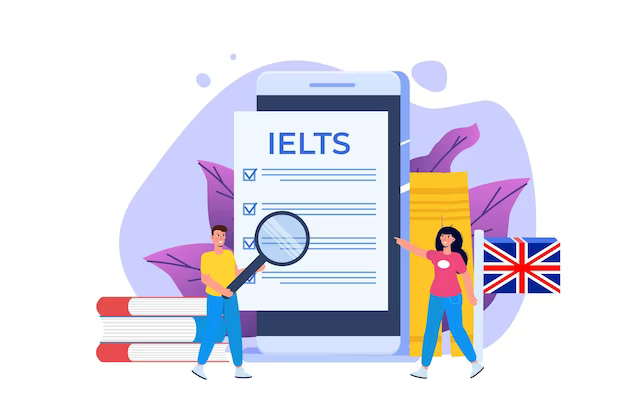
IELTS offers two distinct test options: IELTS Academic and IELTS General Training.
The IELTS Academic exam is designed for individuals who want to study in English-speaking countries or gain professional accreditation. It assesses your readiness for academic study or training and covers important aspects of academic language.
On the other hand, the IELTS General Training test is intended for those who plan to move to English-speaking nations for purposes like secondary education, work experience, or training programs.
The Academic IELTS Exam has two ways to take it: on paper or on a computer. This means you can pick the one you like best. The paper test is like a traditional exam with paper questions and answer sheets. The computer one is more modern, and you use a computer to take it, with some helpful features.
Both tests check how good you are at reading, writing, listening, and speaking in English. People take this test when they want to study at universities in English-speaking countries. It's important because many universities need to know if you can use English well enough to learn there.
You can choose which test suits you better, paper or computer, and show that you know English well. Many universities all over the world recognize this test, so it's a big deal for students who want to study in English-speaking places.
IELTS has established itself as a global benchmark for English language testing, empowering individuals to realize their professional, personal, and academic ambitions. Jointly owned by the British Council, IDP IELTS, and Cambridge University Press & Assessment, their combined worldwide presence and dedication to research solidify their position as leading providers of international English testing, ensuring search engine optimization (SEO) friendly terms are seamlessly incorporated for enhanced online visibility and accessibility.

The British Council is a global organization that connects people worldwide with learning opportunities from the UK and fosters lasting relationships with other countries. Represented in over 140 countries, the British Council serves as the UK's international organization for educational opportunity and cultural relations. For further information, please contact them.

IDP is a leading global education services provider. As an Australian listed company operating in more than 50 countries, IDP's websites attract 100 million visits annually. They specialize in combining human expertise with a cutting-edge digital platform to assist individuals in gaining admission to their preferred courses, taking English language tests, or learning English in their schools. For further information, please contact them.

Cambridge English is a part of the University of Cambridge. They develop and produce leading exams and tests for English learners and teachers; more than 5.5 million assessments are taken every year in over 130 countries. Over 25,000 universities, employers, government ministries, and organizations worldwide rely on Cambridge English exams and qualifications as proof of English language ability. These exams have the backing of over a century of expertise and experience in English language testing. For more information, please visit their website.
The sole eligibility criterion for the IELTS exam in India and worldwide is that a candidate must be a minimum of 16 years old. This examination is open to anyone aged 16 or older, regardless of their gender, nationality, or background. The only exceptions occur when a school specifically requires IELTS scores for admission purposes. Importantly, there are no age restrictions imposed by the overseeing authorities, making it accessible to individuals of all age groups.
To secure a study visa for Canada, candidates must meet specific IELTS band score requirements. For undergraduate and diploma programs, a minimum IELTS score of 6.0 and above overall is necessary, with at least 5.5 in each of the four IELTS bands. In contrast, graduate courses typically require a higher standard, with a minimum IELTS score of 6.5 and above overall and at least 6.0 in each band.
To obtain a study visa for Australia, candidates must satisfy specific IELTS band score prerequisites. For undergraduate programs, a minimum IELTS score of 6.0 overall is required, with at least 5.5 in each of the four IELTS bands. In contrast, graduate courses typically mandate a higher standard, with a minimum IELTS score of 6.5 overall and at least 6.0 in each band. Meeting these criteria is crucial for securing a study visa in Australia.
The minimum IELTS score required for admission to universities in the USA varies, and it is determined by each institution. For instance, prestigious Ivy League schools often specify an overall score of at least 7.0, while other universities typically seek a score of 6.0 or 6.5. It's crucial to research and understand the specific score requirements of the university you plan to apply to in the USA.
| SL | Exam Type | Timeline |
|---|---|---|
| 1 | Computer Delivered | 5-7 Days |
| 2 | Paper Based | 13-15 Days |
| Band | Skill Level | Descriptor |
|---|---|---|
| Band 9 | Expert User | Has complete command of the language. |
| Band 8 | Very good user | With only sporadic unsystematic inaccuracies, you have a complete grasp of the language. |
| Band 7 | Good user | Has a good knowledge of the language, yet there are certain mistakes and misunderstandings in some instances. |
| Band 6 | Competent user | In familiar contexts, can use and understand pretty advanced language. |
| Band 5 | Modest User | Has a limited grasp of the language, coping with the broad meaning in most instances, but is prone to making numerous errors. |